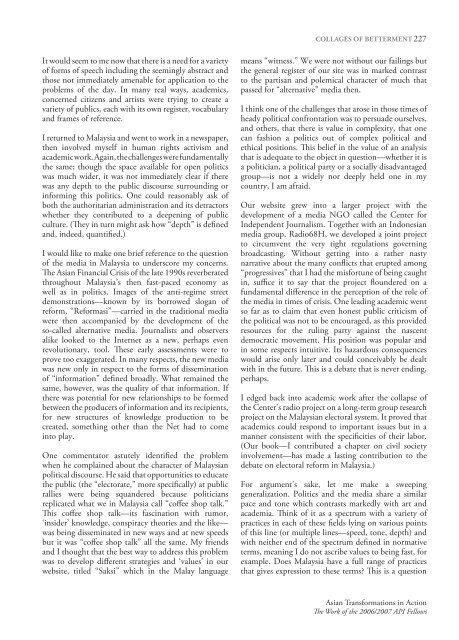Asian Transformations in Action - Api-fellowships.org
Asian Transformations in Action - Api-fellowships.org
Asian Transformations in Action - Api-fellowships.org
You also want an ePaper? Increase the reach of your titles
YUMPU automatically turns print PDFs into web optimized ePapers that Google loves.
COLLAGES OF BETTERMENT 227It would seem to me now that there is a need for a varietyof forms of speech <strong>in</strong>clud<strong>in</strong>g the seem<strong>in</strong>gly abstract andthose not immediately amenable for application to theproblems of the day. In many real ways, academics,concerned citizens and artists were try<strong>in</strong>g to create avariety of publics, each with its own register, vocabularyand frames of reference.I returned to Malaysia and went to work <strong>in</strong> a newspaper,then <strong>in</strong>volved myself <strong>in</strong> human rights activism andacademic work. Aga<strong>in</strong>, the challenges were fundamentallythe same; though the space available for open politicswas much wider, it was not immediately clear if therewas any depth to the public discourse surround<strong>in</strong>g or<strong>in</strong>form<strong>in</strong>g this politics. One could reasonably ask ofboth the authoritarian adm<strong>in</strong>istration and its detractorswhether they contributed to a deepen<strong>in</strong>g of publicculture. (They <strong>in</strong> turn might ask how “depth” is def<strong>in</strong>edand, <strong>in</strong>deed, quantified.)I would like to make one brief reference to the questionof the media <strong>in</strong> Malaysia to underscore my concerns.The <strong>Asian</strong> F<strong>in</strong>ancial Crisis of the late 1990s reverberatedthroughout Malaysia’s then fast-paced economy aswell as <strong>in</strong> politics. Images of the anti-regime streetdemonstrations—known by its borrowed slogan ofreform, “Reformasi”—carried <strong>in</strong> the traditional mediawere then accompanied by the development of theso-called alternative media. Journalists and observersalike looked to the Internet as a new, perhaps evenrevolutionary, tool. These early assessments were toprove too exaggerated. In many respects, the new mediawas new only <strong>in</strong> respect to the forms of dissem<strong>in</strong>ationof “<strong>in</strong>formation” def<strong>in</strong>ed broadly. What rema<strong>in</strong>ed thesame, however, was the quality of that <strong>in</strong>formation. Ifthere was potential for new relationships to be formedbetween the producers of <strong>in</strong>formation and its recipients,for new structures of knowledge production to becreated, someth<strong>in</strong>g other than the Net had to come<strong>in</strong>to play.One commentator astutely identified the problemwhen he compla<strong>in</strong>ed about the character of Malaysianpolitical discourse. He said that opportunities to educatethe public (the “electorate,” more specifically) at publicrallies were be<strong>in</strong>g squandered because politiciansreplicated what we <strong>in</strong> Malaysia call “coffee shop talk.”This coffee shop talk—its fasc<strong>in</strong>ation with rumor,‘<strong>in</strong>sider’ knowledge, conspiracy theories and the like—was be<strong>in</strong>g dissem<strong>in</strong>ated <strong>in</strong> new ways and at new speedsbut it was “coffee shop talk” all the same. My friendsand I thought that the best way to address this problemwas to develop different strategies and ‘values’ <strong>in</strong> ourwebsite, titled “Saksi” which <strong>in</strong> the Malay languagemeans “witness.” We were not without our fail<strong>in</strong>gs butthe general register of our site was <strong>in</strong> marked contrastto the partisan and polemical character of much thatpassed for “alternative” media then.I th<strong>in</strong>k one of the challenges that arose <strong>in</strong> those times ofheady political confrontation was to persuade ourselves,and others, that there is value <strong>in</strong> complexity, that onecan fashion a politics out of complex political andethical positions. This belief <strong>in</strong> the value of an analysisthat is adequate to the object <strong>in</strong> question—whether it isa politician, a political party or a socially disadvantagedgroup—is not a widely nor deeply held one <strong>in</strong> mycountry, I am afraid.Our website grew <strong>in</strong>to a larger project with thedevelopment of a media NGO called the Center forIndependent Journalism. Together with an Indonesianmedia group, Radio68H, we developed a jo<strong>in</strong>t projectto circumvent the very tight regulations govern<strong>in</strong>gbroadcast<strong>in</strong>g. Without gett<strong>in</strong>g <strong>in</strong>to a rather nastynarrative about the many conflicts that erupted among“progressives” that I had the misfortune of be<strong>in</strong>g caught<strong>in</strong>, suffice it to say that the project floundered on afundamental difference <strong>in</strong> the perception of the role ofthe media <strong>in</strong> times of crisis. One lead<strong>in</strong>g academic wentso far as to claim that even honest public criticism ofthe political was not to be encouraged, as this providedresources for the rul<strong>in</strong>g party aga<strong>in</strong>st the nascentdemocratic movement. His position was popular and<strong>in</strong> some respects <strong>in</strong>tuitive. Its hazardous consequenceswould arise only later and could conceivably be dealtwith <strong>in</strong> the future. This is a debate that is never end<strong>in</strong>g,perhaps.I edged back <strong>in</strong>to academic work after the collapse ofthe Center’s radio project on a long-term group researchproject on the Malaysian electoral system. It proved thatacademics could respond to important issues but <strong>in</strong> amanner consistent with the specificities of their labor.(Our book—I contributed a chapter on civil society<strong>in</strong>volvement—has made a last<strong>in</strong>g contribution to thedebate on electoral reform <strong>in</strong> Malaysia.)For argument’s sake, let me make a sweep<strong>in</strong>ggeneralization. Politics and the media share a similarpace and tone which contrasts markedly with art andacademia. Th<strong>in</strong>k of it as a spectrum with a variety ofpractices <strong>in</strong> each of these fields ly<strong>in</strong>g on various po<strong>in</strong>tsof this l<strong>in</strong>e (or multiple l<strong>in</strong>es—speed, tone, depth) andwith neither end of the spectrum def<strong>in</strong>ed <strong>in</strong> normativeterms, mean<strong>in</strong>g I do not ascribe values to be<strong>in</strong>g fast, forexample. Does Malaysia have a full range of practicesthat gives expression to these terms? This is a question<strong>Asian</strong> <strong>Transformations</strong> <strong>in</strong> <strong>Action</strong>The Work of the 2006/2007 API Fellows
















